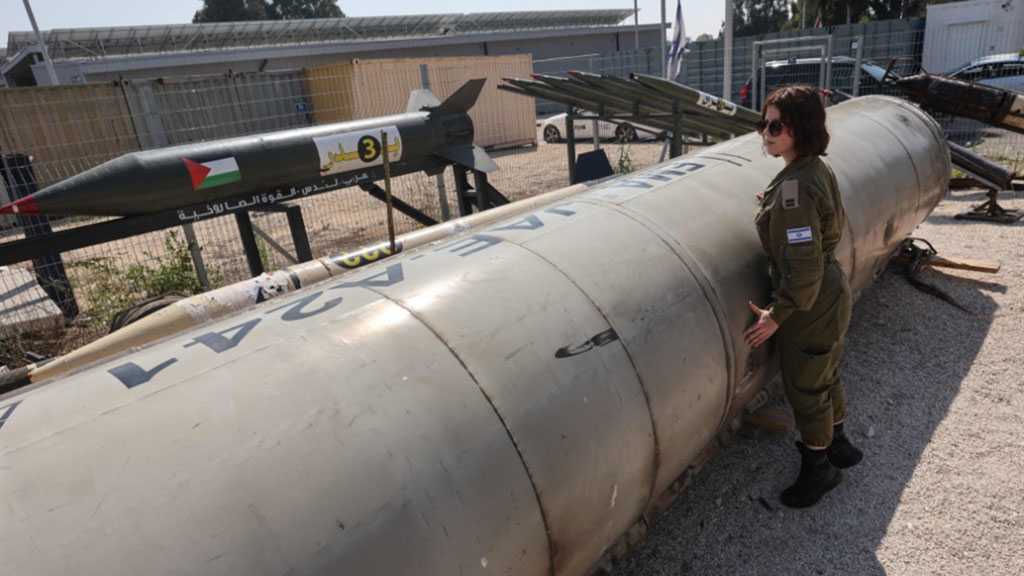The Story of Victory: How “Israel” is Deceiving Itself

Translated by Staff, Al-Akhbar
Iran and “Israel” presented two completely contradictory pictures of what happened at dawn on April 14. This is a rare occurrence when it comes to such developments, which are often interpreted with a degree of neutrality, even by these two parties.
“Israel”, which always claims to be a “credible” source for the reality on the ground, didn’t exactly come off as reliable this time around.
In this particular event, the relatively neutral reading – and the issues are all relative here – didn’t need much in the way of finger pointing.
The battle took place live on television. Its military and technical details and political dimensions were analyzed in the mainstream and on social media like nothing else before.
It’s safe to assume that this is exactly what Iran wanted. In the days leading up to the attack, Iran informed everyone about it, as if it were inviting them to a “wedding”.
Anyone, who is impartial – most people are when they watch an event of this magnitude developing moment by moment, regardless of their previous positions – can only acknowledge that what Iran did was a bold, but calculated, act against an entity that enjoys complete immunity from some of the world’s most powerful and richest states because it wasn’t a reason for the expansion of the war, which is what Tehran said before and after the event.
Since everything was evaluated in a very broad way, it’s important to answer the following questions: Where did “Israel’s” claim of “victory” come from, and what evidence does it have to prove it?
Following the attack, “Israeli” channels celebrated, and still are, what they call a victory over Iran. The media outlets praised “Israel’s” supposed superior military capabilities and technology.
They even downplayed the significance of Western support – both in terms of the role the West played during the attack and in terms of military might. In “Israel” that might include the Iron Dome and the Hetz missiles, which were developed through a joint US- “Israeli” program, as well as weapons manufactured by the US and Western countries and sent to “Israel”, such as the F-35 jets.
These channels also reported the downing of Iranian and non-Iranian missiles and drones by “Israel’s” allies as a secondary matter. For example, an “Israeli” military analyst said on Channel 14, which is close to Benjamin Netanyahu, that the atmosphere in the entire Middle East region was managed that night from an operations room in Tel Aviv.
The closest, or perhaps the only logical, explanation for the image that “Israel” tried to present is that it has been uncarefully searching for an aura of victory since October 7 – a victory that it could not find in the Gaza Strip.
So, it attacked the Iranian consulate in Damascus, hoping to find it there. But since Iran responded quickly and directly in a way that made the “Israeli” response difficult and costly, “Israel” had no choice but to turn the event itself into a “victory.” The “victory” narrative also relieves the “Israeli” decision-makers, i.e. Netanyahu, from the embarrassment of not responding, at least directly.
Therefore, US President Joe Biden, who doesn’t want “Israel” to launch a massive counterattack, helped support this narrative. He was the one who told Netanyahu that the successful interceptions represent a “victory”, and that the Iranian response demonstrated the existence of a strong, cohesive alliance behind “Israel”, breaking the latter’s isolation over the carnage in the Gaza Strip.
Meanwhile, the “Israeli” leadership was more concerned with painting an image for the public of Arab allies defending “Israel”, which was provided by the Jordanian participation in intercepting Iranian missiles and drones. some “Israeli” reports even claimed that Gulf countries were involved.
But this contradicts messages that Gulf countries conveyed to Iran during the same event, namely that they won’t allow their territory to be used as a launchpad for attacks on Tehran. That said, it would not be surprising if some of the Gulf regimes, which are affiliated with “Israel” and the United States, aren’t being truthful about what they are doing. The result in all cases is the same – there aren’t many Arab countries that can be part of an alliance defending “Israel”; at most, there are only one or two.
In addition to the above, if one looks at the picture of “victory” from another angle, it looks different. So why, for example, do we not see a victory for Iran in light of the fact that the powerful countries that support “Israel” were looking for excuses not to get involved in a war with it, while missiles were raining down on the occupying entity and its residents were in shelters?
Wasn't the atmosphere festive for everyone who hated “Israel” and sad and fearful for everyone who supported it? And since Tel Aviv and its allies knew of Tehran’s intentions two weeks before the strike, why did they limit themselves to making plans to shoot down the missiles and did not make plans for a direct response during the battle?
Moreover, what would have happened if Iran sent successive waves of missiles and drones, over several days? Would the interceptions be as effective? What if similar batches were launched from the borders of occupied Palestine, such as Lebanon in the north?
The victory that “Israel” talks about is an illusion. This is why the “Israeli” war cabinet met multiple times to search for a way to retaliate to the Iranian response. Disagreements have emerged among cabinet members as a result of the difficult circumstances surrounding any potential action especially since Iran succeeded in establishing new rules of engagement, through which it committed to launching a more violent attack at the enemy if they decided to target Iranian territory.
Comments




